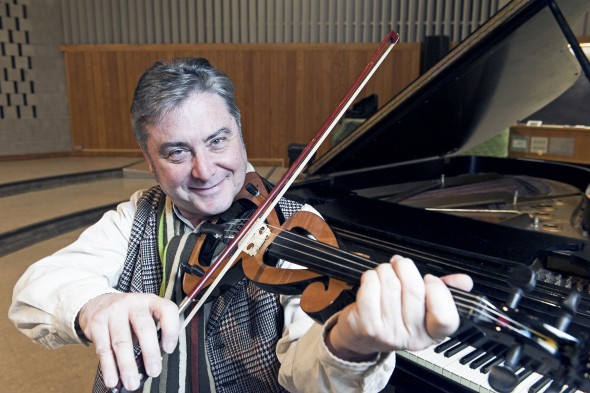The voice of Latin music, heard around the world

Elbio Barilari, who plays the electric viola, hosts WFMT’s “Fiesta!” radio show, which features Latin American music. Photo: Roberta Dupuis-Devlin
As host of the “Fiesta!” radio show, featuring Latin American music and broadcast locally on 98.7 WFMT, Elbio Barilari has a voice heard around the world.
“It started three years ago when the director of WFMT asked me to put together a pilot program,” said Barilari, adjunct lecturer of music.
“It started to be syndicated, and soon we were up to 40 stations, then 100, and now it’s 250,” he said.
“Fiesta!” is broadcast by stations around the country — the public radio station in Rochester, N.Y., is the most recent addition — and in places like Australia, New Zealand, Ireland and Denmark. It airs from 3 to 4 p.m. Sundays, offering Latin American concert music from the 16th to the 21st centuries.
“I go for variety,” Barilari said. “I pick a theme — pieces with Native American or African influence. Another day it could be the relationship between literature and music.
“A very popular program every year is the Day of the Dead. It has nothing to do with Halloween — it’s not scary, but about the celebration of your ancestors.”
One recent broadcast was titled “Three Brazilian Composers Who Are Not Villa-Lobos.”
“I get emails from Alaska, Puerto Rico, Alabama, requesting or saying thanks, asking, ‘When are you going to play music from Bolivia?’” Barilari said.
He introduces each show by saying he’s a professor of Latin American music at UIC. “If there’s a theme, I explain why that theme, who the composers are, background information and historical information if needed,” he said.
“The most important thing is that the program is not a class. The focus is on the music, not on the talk. I try to make it interesting. Clearly it fills some void, some need, because it’s so well-received.”
Barilari thinks of himself as a composer, “first and foremost.”
He began his piece “Diasporas” three years ago. The first two installments were performed in 2013 and 2014. The last section will hit the stage next fall. “It’s being done on a workshop system,” Barilari said. “I work with other musicians, we improvise, and I go home and rewrite.”
The piece uses texts and history of various diasporas, or immigrations, starting with several hundred-thousand years ago in the Olduvai Gorge of Africa, where human ancestor Lucy was found.
The word “diaspora” was first applied to the Athenian colonization of the Mediterranean Sea and Black Sea in the 7th century B.C. Next is the Jewish diaspora, again along the Mediterranean, after the Romans destroyed Jerusalem in the 2nd century A.D. African, Italian and Latin American diasporas followed.
“I’m writing an extended jazz composition that talks about this immigration, ending with our current reality in the U.S.,” Barilari said.
The final version will be performed by a band, actors, a singer and “hopefully dancers,” he said. Yasen Payenkov, director of theatre studies at UIC and a member of the Steppenwolf Theatre ensemble, will narrate the second installment, and, Barilari hopes, the third.
He’s written three other extended jazz compositions. First came “Lincolniana,” commissioned by the Ravinia Music Festival. Then, “Sounds of Hope,” commissioned for the celebration of President Barack Obama’s first inauguration. “Flags to Ashes” was commissioned by WFMT to mark the 10th anniversary of 9/11.
Barilari has penned about 50 compositions, including an opera, a cantata and several symphonic pieces.
He is artistic director of the Latino Music Festival, marking its 10th anniversary this year. It will present 20 concerts in September through December at venues including the Symphony Center, Chicago Cultural Center, Art Institute and Logan Center of the University of Chicago.
On ratemyprofessors.com, students call him an easy grader.
“Not true,” said Barilari. “I make them work, but because the class is fun, they probably don’t realize they’re working.”
This is partly because the classroom is a “smart room” with computer and projector. “If I’m talking about Indians in the Andes, they see how they live, see them singing and playing,” he said. “If it’s about salsa, they’re watching things about salsa history.”
Barilari grew up in Montevideo, Uruguay. He earned bachelor’s and master’s degrees at Universidad de la Republica in Montevideo. “I studied with composers I liked a lot in Brazil for two years, and on invitation from the German Council of Music, I studied in Germany for a year,” he said.
He lives in Ravenswood with his partner, Julia Miller, a composer who teaches at the School of the Art Institute. Her son, James, is 8.
Barilari is also a writer. He was editor-in-chief of La Raza, the Spanish-language newspaper published in Chicago, from 1998 to 2006. He wrote a novel, Lugares Comunes, about the return to society of political prisoners in Latin American military dictatorships, and he put together several award-winning collections of short stories.
“After ’94 I never wrote fiction again,” Barilari said. “I got more involved, entangled, attracted by music.
“The music won.”
